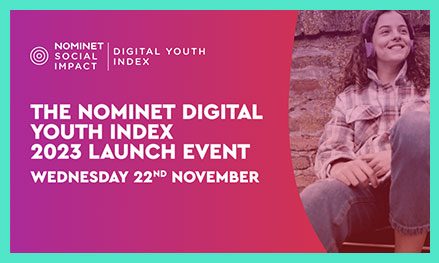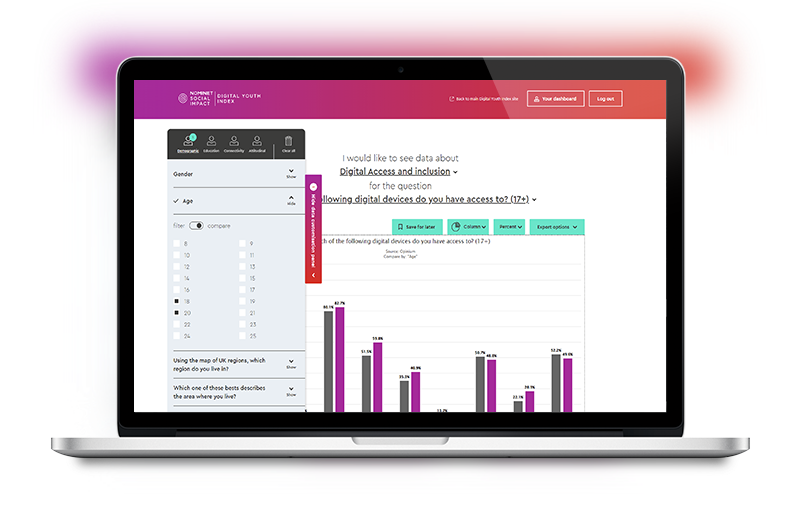So, for me it is a great opportunity to be on the advisory panel for Nominet’s Digital Youth Index. It is a fantastic group to be part of to help me get my thoughts in order around the various opportunities, risks and behaviours faced by young people that are enabled or magnified by digital.
The Nominet Digital Youth Index has launched its second year of findings earlier this week and of course the second year of any index is crucial as we can start to look for patterns as we track the findings over time. When the Index first launched in 2021, I wrote a piece about how it was making us ask some big questions about our vision for society. Inevitably as we looked at the data, and considered what it was telling us, we had to weigh it up against our own sense of the ideal. Many of the questions were very useful frames for asking the reader – have you got clear in your mind where we are trying to get to? What would be better? What would be fairer? Where might interventions be useful?
Reading this year’s Index I find myself struck by some quite different notions.
I have a daily view of my children using the Internet, apps, online gaming and so on but of course it’s a very narrow view – a tiny bubble. The Index helps me see much further and wider. When it comes to digital access, how opposite things can be true at the same time. I’ll explain with an example of anonymity which can be a good and enabling thing and a bad thing at the same time.
An emergent topic from the 2022 Index are considerations around anonymity. One of the major opportunities that young people identify about the web is it they can look for help and advice from other young people who may be experiencing something similar to what they are experiencing and may be able to offer authentic guidance about what has worked for them. One young person makes it clear that anonymity is crucial to enable this kind of support. Primarily anonymity seems to work as a protection from the judgement of those around you, or who you have decided you don’t want to be seen by
The Index also refers to examples where young people feel unable to speak to their parents about a subject, potentially because they feel their parents are too strict or it would just be too embarrassing a conversation
, but it also does something else. The Index shows us that the Internet has created an alternative to more standard societal hierarchies and played a key role in shifting the balance of power. For example, society would still on the whole prefer a young person to ask a doctor, a teacher, or a parent for advice on something difficult they were going through – the Internet offers an alternative that some young people actively prefer – why not connect to people like you and find out directly about their experiences? There are some great quotes around this in the Index but one that stood out for me is that for some young people this isn’t an alternative they simply don’t have people in their life they can trust and rely on – and their lives and circumstances mean that they already feel at risk – anonymity is essential for them.
“[People prefer going online] to remain anonymous, so others don’t know they are struggling or maybe because they don’t have people in their life that they can trust/rely on for advice.” 22-year-old female (LGBTQ+)
So, on the one hand we can see the role that anonymity can play in breaking down divides, offering up new power structures and enabling young people to find advice as part of a community even if they don’t need to reveal their true identities within it.
At the very same time the Index points to anonymity being deeply problematic. One young person says: ‘I think the removal of a persons’ anonymity would make the Internet a much happier and safer place’. It’s clear from the Index that young people feel that a lot of the negative experiences they have online are actually enabled by anonymity. Trolling and the creation of negative and harmful content without consequences is enabled by people being able to hide behind fake identities. Young people often take the view that anonymity is the reason why people behave so badly on the Internet.
One young person points out that racist homophobic and ablest people exist on the Internet as much as they do in real life. But the overall sense is that somehow the Internet allows them to behave differently to how they might in the physical world.
The fact that anonymity can be both a good and a bad thing at the same time I suppose should not be surprising. But seeing it so starkly in the Index has made me think about the complexity of young peoples’ lives and the continuing risk of oversimplification that is often necessary for the media to create neat compelling stories or Clickbait!
“I think people prefer going online for support because it is convenient, and you don’t have to go to someone that you know with a question that you feel is embarrassing or something that you feel you should already know about. Especially for difficult topics such as mental health, sexuality or health questions, because it can feel embarrassing to voice them to people that you know and are close with.” 24-year-old female (cognitive disability)
As the Online Safety Bill moves at its glacial pace through government – it’s clear to me that the complex trade-offs that are essential for young people’s digital lives are unlikely to be boiled down to single positions – instead there must be an incredible amount of conscious consideration, common sense, balancing the benefits against the harms and yes, an acceptance that multiple things in tension can be true at the same time.
There are of course many other complex factors that are explored in the Nominet Digital Youth Index and I’d strongly recommend anyone working in digital to have a closer look. The critical step as the Index proves is how important it is to listen to what young people have to say.

Justin Spooner, Unthinkable
A digital strategist working in education and culture at Unthinkable, Justin is passionate about how the right technology can improve human connection, learning and creativity.
Share this article








